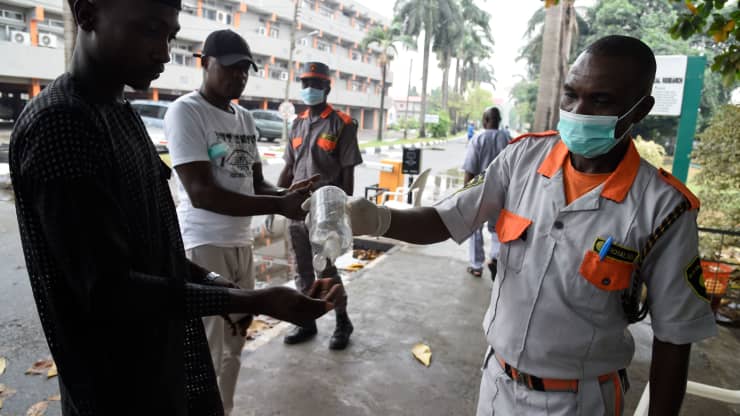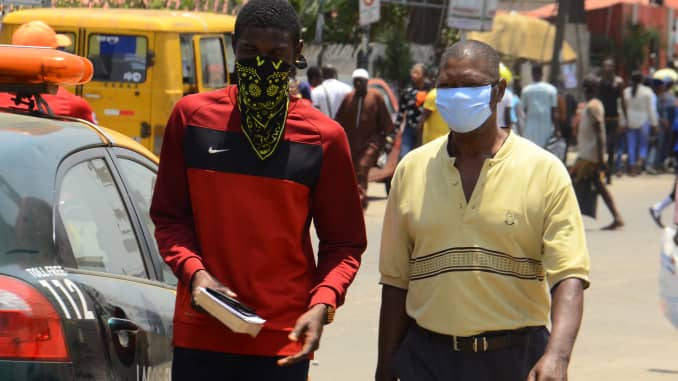
The coronavirus pandemic has sharpened the lens on a substantial health-care spending gap in Africa’s largest economy, and international investors are seeking to fill the void.
When it comes to health care, Nigeria is lagging its comparable African neighbors in terms of expenditure and access.
For example,Nigeria’s public spending on health care amounts to just 3.89% of its $495 billion GDP (gross domestic product), according to the latest available figures from the World Bank, compared to 8.25% in South Africa and 5.17% in Kenya.
According to a recent report from real estate consultancy Knight Frank, Nigeria would require 386,000 additional beds and $82 billion of investment in health-care real estate assets to reach the global average of 2.7 beds per thousand people.
Also, Nigeria’s 206 million population is expected to almost double by 2050, according to the U.N., which would see it become the third-most populous country in the world.
All of this — especially combined with the coronavirus pandemic — has sparked an interest in the sector from foreign investors.
A Knight Frank poll of 140 global investors in June found that 80% were considering investment in African health infrastructure in light of the coronavirus crisis. This interest centered primarily around hospital-related real estate and operating companies in collaboration with domestic experts.
As is the case across much of the African continent, Nigeria has managed to keep its coronavirus caseload relatively low given the size of its population, recording 90,080 cases and 1,311 deaths as of Monday morning, according to data compiled by Johns Hopkins University.
International interest growing
Even prior to the pandemic, African health-care assets had begun to generate interest more broadly. The International Finance Corporation, part of the World Bank, partnered with the Investment Fund for Health in Africa-II (IFHA-II) in November 2019 to form a $115 million acquisition vehicle for health-care service businesses in the east and south of the continent.
European development finance organizations such as Swedfund, the Swedish development finance institution, have backed IFHA, along with the likes of Pfizer and the Stichting Social Investor Foundation for Africa, whose backers include Aegon, Heineken, Shell and Unilever among others.
Since the onset of the pandemic, the Nigerian government has issued 100 billion naira ($254.6 million) in state credit facilities for health care, from pharmaceutical companies and product manufacturers to service providers, which has seemingly spurred greater interest from private investors. The Bank of Industry, a Nigerian development finance institution, is supplying a further 50 billion naira.
“There is a very compelling opportunity for the development of world-class healthcare facilities across Africa, but especially Nigeria,” said Hafeez Giwa, managing partner at HC Capital Properties, which has started to invest in health-care assets in Nigeria.

“Most of the public hospitals here were constructed over 40 years ago and only a handful have received any investment since then,” Giwa said in a report published Monday by frontier markets consultancy New Markets Media & Intelligence.
Tosin Runsewe, CEO at health-care investment firm AfyACare Nigeria, highlighted another opportunity: obligatory health insurance for federal employees would see insurance costs lowered and the percentage of health-care costs covered could rise to between 20% and 30% by 2030.
As it stands, around 72% of household health-care expenditure is out-of-pocket, compared to the sub-Saharan average of 35%, the Knight Frank report highlighted, and only 5% of health care is covered by insurance.
“If we could attain a critical mass of 40 million to 60 million Nigerians with healthcare cover, the cost of this treatment could be met through health insurance premiums of around only 20,000 Naira ($50) a year, half the current average cost,” Runsewe said.
“There is an array of opportunities for investors in private primary healthcare clinics that can provide services at an affordable cost.”

Giwa said HC Capital Properties was investing in Nigeria due to both “extreme need” and government initiatives which have rendered it easier to develop high-quality assets that offer affordable care. He suggested that there are two types of investors currently exploring these opportunities.
“On the one hand, there are local institutional investors and local pension funds that, in Nigeria’s case, are Naira investors and do not have any concerns about currency risk,” Giwa said.
“On the other hand, there are development impact investors and institutions that are excited by the prospect of delivering high-quality healthcare to lower- and middle-income Nigerians.”
He anticipates that the pandemic has brought about a “permanent change in thinking” which will place greater emphasis on quality health care at home.
At present, Nigeria loses up to $1 billion per year to outbound health tourism among wealthier Nigerians due to inadequate domestic access, according to a recent PwC report.